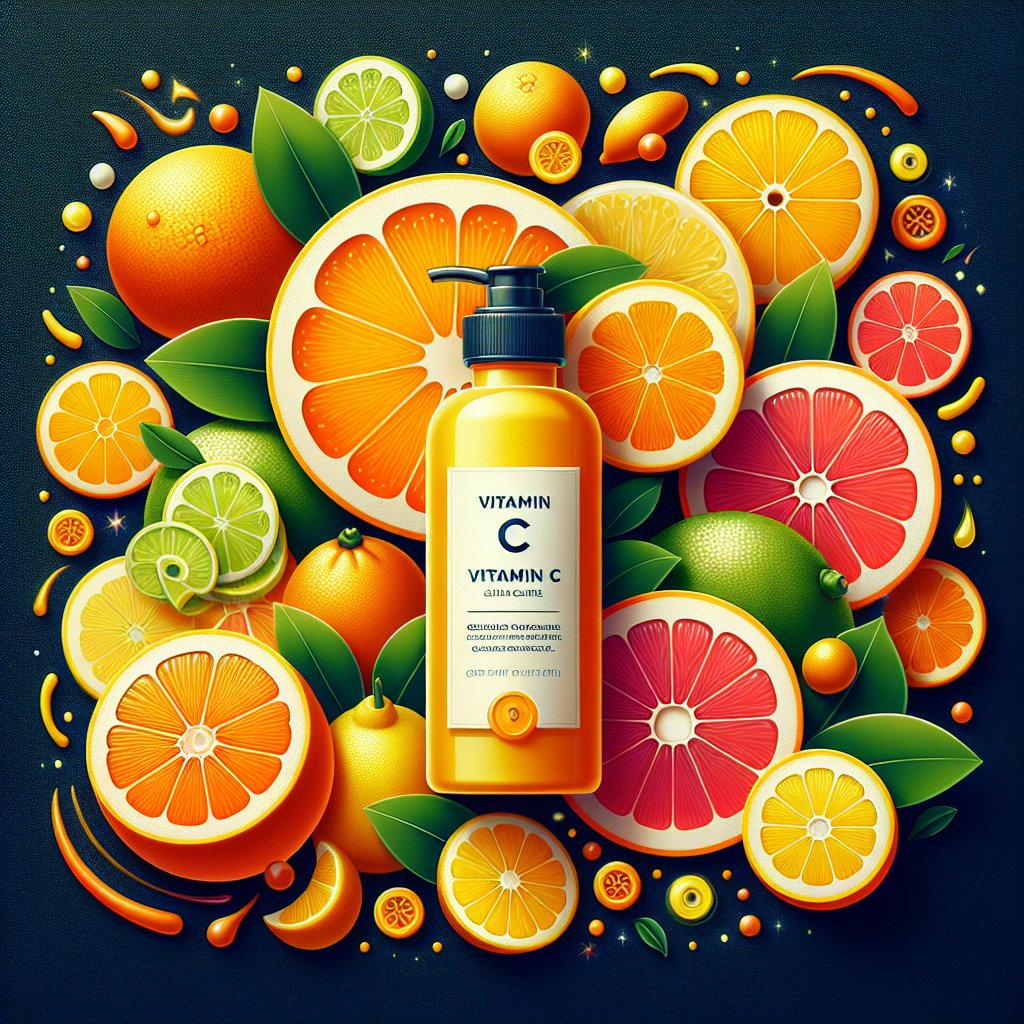Niacinamide vs Vitamin C: The Ultimate Skincare Showdown Revealed! Find Out Which Is Perfect for Your Skin Type
Brief Explanation of Niacinamide and Vitamin C in Skincare
Welcome, lovely readers! Today, we’re diving into the wonderful world of skincare to explore the showdown between two powerhouse ingredients: niacinamide and vitamin C. These two components have taken the beauty industry by storm, and for good reason. Let’s start with a brief breakdown of what niacinamide and vitamin C are and their common uses in skincare.
Niacinamide
Niacinamide, also known as vitamin B3, is a water-soluble vitamin that offers a myriad of benefits for the skin. This powerful ingredient is celebrated for its ability to improve skin texture, minimize pores, and strengthen the skin’s barrier. Research has shown that niacinamide possesses anti-inflammatory properties, making it ideal for calming redness, soothing irritation, and combating acne. Furthermore, it helps in reducing the impact of environmental damage, thus contributing to overall skin resilience and health.
Vitamin C
On the other hand, we have vitamin C, the beloved antioxidant that’s hailed for its brightening, firming, and protective properties. Vitamin C, or ascorbic acid, is celebrated for its ability to neutralize free radicals, stimulate collagen production, and fade pigmentation and dark spots. As reported in a study published in the Indian Dermatology Online Journal, vitamin C’s antioxidant capabilities help in shielding the skin from the harmful effects of UV radiation and environmental pollutants, bolstering its natural defense mechanisms.
Both niacinamide and vitamin C are veritable powerhouses when it comes to skincare, each offering unique benefits that cater to different skin types and concerns. As we journey through this blog, we’ll uncover the specific advantages of each ingredient and help you pinpoint which one may be perfect for your skin type. So, buckle up and get ready for an enlightening skincare exploration!

Benefits of Niacinamide
Hey there, skincare enthusiasts! If you’re on the lookout for a game-changing skincare ingredient, niacinamide should definitely be on your radar. This powerhouse component has been making waves in the beauty industry for its remarkable benefits. Let’s dig into the amazing skincare benefits of niacinamide and why it’s a must-have for your skincare routine.
Improving Skin Texture
One of the most remarkable benefits of niacinamide is its ability to improve skin texture. Research has shown that niacinamide can enhance the skin’s barrier function, leading to improved hydration and a smoother, more even complexion. This means saying goodbye to rough patches and hello to a softer, more supple skin texture.
Reducing Redness
Are you battling with redness and irritation? Niacinamide might just be the solution you’ve been searching for. Studies have demonstrated that niacinamide possesses anti-inflammatory properties, making it an excellent choice for calming red, irritated skin. Whether it’s dealing with rosacea or just a case of general redness, niacinamide can help to soothe and even out your skin tone.
Regulating Oil Production
If you struggle with oily skin, niacinamide could be your new best friend. Research has indicated that niacinamide can help regulate sebum production, leading to a reduction in excess oiliness. By incorporating niacinamide into your skincare routine, you can achieve a more balanced and mattified complexion without stripping your skin of essential moisture. Say hello to a more balanced and comfortable skin feel!
Benefits of Vitamin C
Let’s dive into the wonderful world of skincare benefits offered by the mighty vitamin C. This powerful nutrient isn’t just for keeping the common cold at bay; it’s also a game-changer for achieving that coveted healthy and radiant complexion.
Antioxidant Properties
Vitamin C is a potent antioxidant, which means it helps protect the skin from damage caused by free radicals. These pesky free radicals come from environmental stressors like pollution and UV radiation. By incorporating vitamin C into your skincare routine, you’re essentially giving your skin a shield to ward off these harmful effects, ultimately promoting a healthier and more youthful appearance.
Brightening Skin
Dark spots, hyperpigmentation, and uneven skin tone – sound familiar? Vitamin C is here to save the day! The ingredient has been shown to inhibit melanin production, which can help lighten those pesky dark spots and even out your skin tone, leaving you with a brighter, more luminous complexion. It’s like a magic eraser for pesky spots and dullness!
Boost Collagen Production
Collagen is crucial for maintaining skin’s firmness and elasticity. As we age, collagen production naturally declines, leading to sagging skin and the formation of wrinkles. Vitamin C comes to the rescue by stimulating collagen synthesis, effectively keeping your skin looking and feeling plump and youthful. Plus, who doesn’t want a little extra bounce in their skin?
Incorporating vitamin C into your skincare routine can help you achieve a healthy, glowing complexion while protecting your skin from external stressors. Now that’s what I call a win-win situation!
Comparison of Niacinamide and Vitamin C
When it comes to skincare, niacinamide and vitamin C are two powerhouse ingredients that have gained widespread popularity for their remarkable benefits. Let’s delve into the differences in benefits, uses, and suitability for different skin types between niacinamide and vitamin C.
Niacinamide
Niacinamide, also known as vitamin B3, is a versatile ingredient known for its multitasking abilities. It offers a myriad of benefits, making it suitable for various skin types. Niacinamide is celebrated for its ability to enhance the skin’s barrier function, improve texture, and minimize the appearance of pores. It also helps in reducing inflammation, making it an excellent choice for those with sensitive or acne-prone skin.
Vitamin C
Vitamin C, or ascorbic acid, is a potent antioxidant that is revered for its brightening and anti-aging properties. It helps in neutralizing free radicals, stimulating collagen production, and fading hyperpigmentation. Vitamin C is especially beneficial for those concerned with dullness, fine lines, and sun damage. However, it can be a bit challenging for individuals with sensitive skin to tolerate high concentrations of vitamin C.
Suitability for Different Skin Types
When considering suitability for different skin types, it’s important to note that niacinamide tends to be more universally tolerated. Its non-irritating nature makes it suitable for sensitive, acne-prone, and dry skin. On the other hand, while vitamin C is generally well-tolerated, individuals with sensitive skin may experience some irritation, especially with high concentrations of pure vitamin C.
In conclusion, both niacinamide and vitamin C offer incredible benefits for the skin. While niacinamide is more versatile and gentle, vitamin C is potent and ideal for addressing specific concerns like brightness and aging. Consider incorporating both into your skincare routine to enjoy a wide range of benefits.
Usage in Skincare Routine
Now that we’ve discussed the benefits and differences between niacinamide and vitamin C, it’s time to talk about how to incorporate these powerhouse ingredients into your skincare routine for maximum effectiveness.
Niacinamide:
Niacinamide is incredibly versatile and can be used in both the morning and evening. It’s gentle and well-tolerated by most skin types, making it suitable for daily use. A niacinamide serum can be applied after cleansing and toning, but before heavier treatments or moisturizers. This allows it to penetrate the skin effectively and work its magic.
Vitamin C:
Vitamin C is best used in the morning as it helps protect the skin from environmental stressors like pollution and UV damage. Look for a stable vitamin C serum and apply a few drops to clean, dry skin. Give it a few minutes to fully absorb before applying sunscreen and makeup.
When using both niacinamide and vitamin C in your skincare routine, it’s essential to layer them correctly to avoid any potential interactions. The good news is that according to research studies, niacinamide and vitamin C can be used together without any negative side effects. In fact, they complement each other beautifully, creating a synergistic effect for healthy, glowing skin. However, some experts recommend applying vitamin C in the morning and niacinamide in the evening to ensure maximum effectiveness.
Remember to always follow up with a broad-spectrum sunscreen during the day to protect your skin from UV damage, especially when using vitamin C.
By incorporating niacinamide and vitamin C into your skincare routine, you’re giving your skin the best of both worlds – hydration, brightening, and overall skin health. Consistency is key, so be patient and give these potent ingredients time to work their magic!
Side Effects and Precautions
When it comes to incorporating niacinamide and vitamin C into your skincare routine, it’s important to be aware of the potential side effects and take necessary precautions for safe usage.
Potential Side Effects of Niacinamide:
Niacinamide is generally considered safe for topical application and is well-tolerated by most skin types. However, in some rare cases, it can lead to mild side effects such as:
- Slight redness or irritation
- Dryness
If you experience any of these symptoms, it’s advisable to discontinue use and consult a dermatologist for further guidance.
Potential Side Effects of Vitamin C:
Vitamin C is a potent antioxidant that offers numerous benefits to the skin. However, it’s important to note that some individuals may experience the following side effects when using vitamin C topically:
- Mild tingling or stinging sensation
- Minor irritation or redness, especially in individuals with sensitive skin
If you encounter any of these reactions, it’s recommended to use the product less frequently or opt for a lower concentration of vitamin C to prevent further irritation.
Precautions to Take When Using These Ingredients:
To ensure the safe and effective use of niacinamide and vitamin C in your skincare regimen, consider the following precautions:
- Perform a patch test: Before applying a new product containing niacinamide or vitamin C to your face, conduct a patch test on a small area of skin to check for any adverse reactions.
- Start with lower concentrations: If you have sensitive skin, begin with lower concentrations of niacinamide and vitamin C to allow your skin to acclimate to the ingredients.
- Use sunscreen: Both niacinamide and vitamin C can make your skin more sensitive to the sun. Therefore, it’s crucial to apply sunscreen as the final step in your morning routine to protect your skin from harmful UV rays.
By being mindful of these potential side effects and taking the necessary precautions, you can enjoy the remarkable benefits of niacinamide and vitamin C while promoting healthy, glowing skin.
Choosing the Right Product
When it comes to selecting skincare products containing niacinamide or vitamin C, it’s essential to consider your individual skin concerns and needs. Both niacinamide and vitamin C offer various benefits and can address different skin issues, so choosing the right product will depend on what you’re looking to achieve.
Niacinamide for Your Skin Concerns
If you’re dealing with concerns such as redness, dullness, fine lines, or an uneven skin tone, niacinamide could be the perfect addition to your skincare routine. This powerhouse ingredient is known for its anti-inflammatory properties, which can help reduce redness and calm irritated skin. Additionally, niacinamide is effective in improving the skin’s texture, minimizing the appearance of pores, and enhancing overall skin tone, making it suitable for individuals with varied skin concerns.
Vitamin C for Your Skin Concerns
On the other hand, if your primary skin concerns revolve around uneven skin tone, hyperpigmentation, sun damage, or fine lines, incorporating vitamin C products into your routine may be the way to go. Vitamin C is renowned for its antioxidant properties, which can help brighten the skin, fade dark spots, and protect against environmental stressors such as UV damage and pollution.
Now, if you’re looking for a product that targets multiple concerns, rest assured that some skincare formulations contain both niacinamide and vitamin C, offering a comprehensive solution for various skin needs.
Remember, no matter which ingredient you choose, it’s crucial to introduce new products gradually and patch-test to ensure compatibility with your skin. Additionally, consistency is key when it comes to reaping the full benefits of these potent ingredients.
Let’s delve further into the properties of niacinamide and vitamin C to better understand how each can benefit your specific skin type and concerns.
Conclusion
In conclusion, both niacinamide and vitamin C have remarkable benefits for your skin. Niacinamide has shown promising results in improving the skin barrier function, diminishing redness, and reducing sebum production, making it an excellent choice for individuals struggling with acne or rosacea. On the other hand, vitamin C is a potent antioxidant that can brighten the skin, fade dark spots, and protect against environmental damage, making it a great option for those seeking anti-aging benefits.
It is important to note that the effectiveness of these skincare ingredients can vary based on individual skin types and conditions. Therefore, consulting with a dermatologist is crucial to receive personalized advice tailored to your specific needs. They can assess your skin concerns, evaluate your current skincare routine, and recommend the most suitable products for you.
Remember, what works for one person may not work for another, so it’s essential to approach skincare with a personalized and informed mindset. Always conduct patch tests when introducing new products and be patient, as visible results may take time to appear.
Ultimately, whether you choose niacinamide or vitamin C, incorporating these powerhouse ingredients into your skincare regimen can help you achieve a radiant and healthy complexion. So, go ahead, consult with a dermatologist, and embark on your journey to glowing skin!


